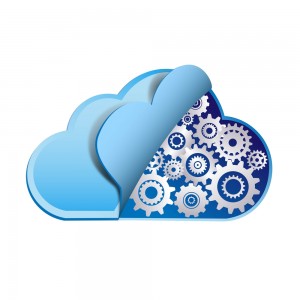
Ahhh, The Cloud. The word that used to conjure images of wispy floating droplets of water now means something very different. And as you probably know, the new definition has less to do with earth science and more to do with computer science.
We’re dedicating this week’s blog to taking a deeper dive into the inner workings of the cloud and explore how it can help improve your PC safety.
Though the sound of it is somewhat nebulous (hehehe, okay no more cloud jokes from here on in, we promise), the cloud is really very simple to understand. It is a term given to the storing of information on third-party servers instead of your own hard drive or local network. Before the cloud, all of your data remained close by, either on your own computer or on a local network.
In the 1950s, giant mainframes, too big to be installed anywhere but in the largest of institutions, relied on “dumb terminals” to allow multiple users to access information and resources. The concept evolved, and somewhere in the mid-2000s, starting with Amazon and followed by Microsoft and Google, companies saw the opportunity to “rent out” space while providing world-class IT resources to businesses and individual consumers who otherwise would never be able to access such high-level technology.
Want a real-life example of how you may already be “in the cloud” without knowing it? If you have a Gmail account, you access the cloud every time you check email. That’s because all of your email is hosted in the Google cloud. That’s what makes it possible for you to access your email from any location, as long as you have internet access and your password. Of course, if you have any documents or spreadsheets saved on Google Drive, these are also hosted on the Google cloud. This means that if your computer is ever stolen or your hard drive goes kaput (these things do happen), your information is still safe and sound in the Google cloud.
Being reliant on the cloud for your information may seem a bit worrisome at first glance. Indeed, there are some factors that need to be considered to make sure your information remains secure. After all, back at the server facility, there could be employees who could take a peek at your information. That’s why cloud providers are expected to perform background checks on all employees with access to sensitive information.
Also, structural flaws within the design of a cloud could leave room for breaches. For example, in 2011, popular file sharing, syncing and backup platform Dropbox admitted that it had published code on its website that enabled anyone to sign in to any Dropbox account without credentials. This was a serious lapse of security, and though the damage was minimal, the lesson was learned. The cloud contains lots of important information, and cloud companies need to ensure that this information is safe.
When it comes to security, cloud technology offers a particularly important benefit. This is especially true in the world of antivirus and anti-malware software, where the cloud can serve as an extra layer of protection by providing a safe environment, not directly on your PC, for checking suspicious files.
In this manner, cloud-based antivirus protection is an excellent addition to traditional antivirus protection. It goes beyond the capabilities of regular antivirus technology, enabling you to protect yourself from threats that haven’t even been discovered yet. Protection from these threats, commonly known as zero-day attacks, is exactly the purpose behind ZoneAlarm’s Threat Emulation.
Threat Emulation is the technology used in ZoneAlarm Extreme Security to protect you from malicious software and zero-day attacks. Threat Emulation enables you to check unknown files in a cloud environment before opening them on your computer. The behavior of these files is carefully analyzed, and if anything looks suspicious, the file is marked so you can delete it before it infects your computer.
Thanks to the cloud, Threat Emulation technology is able to quickly identify completely new, unknown threats or zero-day threats and stop them before they compromise the safety of your PC. Traditional antivirus technology can’t do this because it relies on databases of known viruses. While this is sufficient for stopping malicious files that have already been identified, if a type of malicious software is completely new, such a database isn’t very helpful.
Like anything in life, being in the cloud comes with pluses and minuses. For example, if you’ve saved documents in the cloud, you’ll need an internet connection to retrieve them. Furthermore, the safety of the material you store in the cloud depends upon the safety of the cloud you’ve chosen. At the same time, and when it comes to ensuring the safety of your computer, the cloud offers an exceptional benefit of enabling files to be opened and analyzed before they are downloaded on your PC. This can protect you from unleashing brand-new threats on your computer, and there’s nothing nebulous about that!